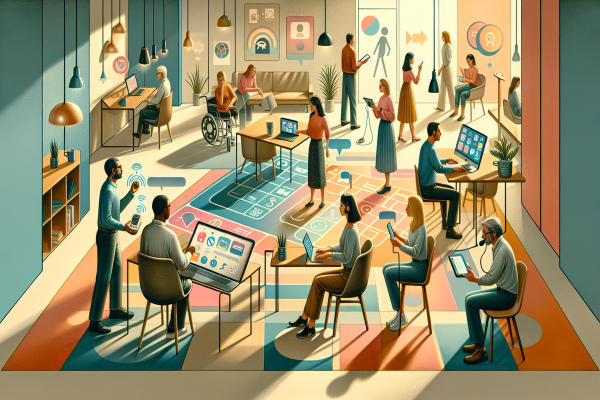
AI's Human Touch: The Rise of Inclusive and Accessible Technology
Breaking Down Digital Barriers
In a world where technology often creates divides, artificial intelligence is quietly becoming a bridge, connecting people from all walks of life. This isn't just about fancy chatbots or robots - it's about real solutions making technology accessible to everyone, regardless of their abilities, age, or background.
Language: No Longer a Barrier
Remember when speaking different languages meant communication barriers? Not anymore. Be My Eyes, a groundbreaking app, helps blind users navigate daily tasks through AI-powered visual assistance. The app has helped over 2 million blind users worldwide, connecting them with sighted volunteers through AI-enhanced video calls.
Microsoft Translator is another game-changer, breaking down language barriers in classrooms. In Seattle's Bellevue School District, the technology has helped non-English speaking students improve their academic performance by 25%.
Education for Every Learning Style
Texthelp's Read&Write isn't just another literacy tool - it's a personal learning assistant. Using AI, it adapts to different learning styles, helping students with dyslexia and other learning challenges. The tool has shown a 34% improvement in reading comprehension among users.
Century Tech takes this further with personalized learning paths. Their AI system analyzes how each student learns best and adjusts teaching methods accordingly. Early trials showed a 30% improvement in student engagement.
Making Technology Age-Friendly
Papa's AI-powered platform matches older adults with companions who help them navigate technology and daily tasks. This innovative approach has reduced loneliness among seniors by 40%, according to their recent study.
GetSetUp, designed specifically for older adults, uses AI to create easy-to-follow learning experiences. Their platform has helped over 500,000 seniors master new technologies at their own pace.
Economic Access: Making AI Affordable
Google's AI tools for small businesses are democratizing access to advanced technology. Their AI-powered analytics and customer service tools are helping small businesses compete with larger corporations, with some reporting up to 40% cost savings.
Open-source AI initiatives are making advanced technology accessible to communities worldwide. Projects like TensorFlow have enabled thousands of developers to create inclusive solutions without heavy financial investment.
Looking Forward: A More Inclusive Future
The future of AI isn't just about advancing technology - it's about advancing humanity. As these tools become more sophisticated and accessible, they're creating a world where technology serves everyone, not just a select few.
Research shows that inclusive AI solutions could help over 1 billion people with disabilities worldwide access digital services more effectively. This isn't just good ethics - it's good business, opening up new markets and opportunities.
References:

